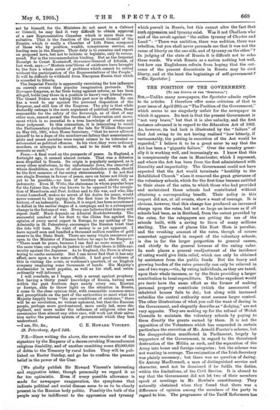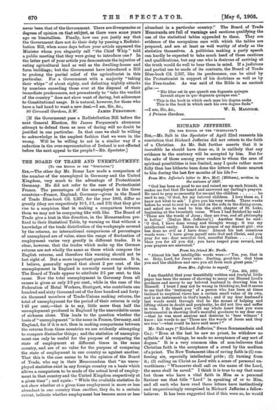[To TEN EDITOR OP THX "SPXOTATOR:] Sut,—Unlike many newspapers, the
Spectator admits replies to its articles. I therefore offer some criticism of that in your issue of April 29th on " The Position of the Government," which seems to me singularly unfair for the newspaper in which it appears. Its text is that the present Government is " not very brave," but that it is also unlucky, and the first instance advanced is in regard to the Education Act of 1902. As, however, its bad luck is illustrated by the " failure" of that Act owing to its not having realised " how bitterly, if unreasonably, the putting in execution of the Act would be regarded," I believe it to be a great error to say that the Act has been a "gigantic failure." Over the country gener- ally it is working well, and increasingly so. I know that this is conspicuously the case in Manchester, which I represent, and where the Act has been from the first administered with liberality and impartiality. The Government could not have expected that the Act would terminate " hostility to the Established Church " when it removed the great grievance of the voluntary schools, which for the first time became entitled to their share of the rates, to which those who had provided and maintained those schools had contributed without obtaining a corresponding benefit. Their policy in this respect did not, at all events, show a want of courage. It is obvious, however, that this change has produced an increased charge upon the rates, but not so large an increase as if all schools had been, as in Scotland, from the outset provided by the rates, for the ratepayers are getting the use of the schools built, with a saving to them of many millions sterling. The case of places like East Ham is peculiar, and the crushing amount of the rates, though of course somewhat aggravated in respect of the voluntary schools, is due in far the larger proportion to general causes,' and chiefly to the general lowness of the rating value. In such places a general readjustment of the incidence' of rating would give little relief, which can only be obtained by assistance from the public funds. But the heavy and growing burden of the rates generally can only be relieved in one of two ways,—viz., by rating individuals, as they are taxed, upon their whole incomes, or by the State providing a larger contribution to local expenditure. The latter expedient would pro tanto have the same effect as the former of making personal property contribute (which the assessment of inhabited houses fails to do) ; but along with increased subsidies the central authority must assume larger control. The other illustrations of what you call the want of daring in the Government, and elegantly describe as " dodging," are not very apposite. They are making up for the refusal of Welsh Councils to maintain the voluntary schools by paying to them directly the grants earned by them. It is not the opposition of the Volunteers which has suspended in certain particulars the execution of Mr. Arnold-Forster's scheme, but the disapprobation manifested in Parliament, largely by supporters of the Government, in regard to the threatened destruction of the Militia as such, and the separation of the' Army into home and foreign categories ; but the scheme was not wanting in courage. The resignation of the Irish Secretary was plainly necessary ; but there was no question of daring. Sir Antony MacDonell, a man of distinguished service and character, need not be dismissed if he fulfils the duties, within the limitations, of the Civil Service. It is absurd to say that the Government did not let two of their members speak at meetings in Mr. Bowles's constituency. They naturally abstained when they found that there was a difference of opinion among the members of the party in regard to him. The programme of the Tariff Reformers has never been that of the Government. There are divergencies or degrees of opinion on that subject, as there were some years ago on bimetallism. Finally, how can you justly say that the Government dare not do their duty by passing a Redistri- bution Bill, when some days before your article appeared the Minister whom you elegantly call "the Chief Whip" told a public meeting that they were going to introduce one P In the latter part of your article you demonstrate the injustice of rating agricultural land as well as the dwelling-house and farm buildings ; but the Government have introduced a Bill to prolong the partial relief of the agriculturist in this particular. For a Government with a majority "taking their whips " of about eighty, and defeating nightly attacks by numbers exceeding those ever at the disposal of their immediate predecessors, not prematurely to " take the verdict of the country" does not show want of daring, but adherence to Constitutional usage. It is natural, however, for those who have a bad hand to want a new deal.—I am, Sir, &c., 80 Cornwall Gardens, S. W. JAMES FERGIISSON.
gibe :—
[If the Government pass a Redistribution Bill before the next General Election, Sir James Fergusson's strenuous attempt to defend them as men of daring will no doubt be justified in one particular. In that case we shall be willing to acknowledge in the amplest fashion that we were in the wrong. Will he be willing to act in a similar way if a reduction in the over-representation of Ireland is not effected before the next appeal to the people P—ED. Spectator.]











































 Previous page
Previous page